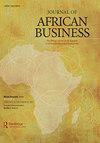Succession Planning: Perceptions of South African Family-Owned Small Enterprises
IF 1.8
Q3 BUSINESS
引用次数: 0
Abstract
ABSTRACTThis research investigated the perceptions of family-owned small enterprises on the reasons of the absence of written succession plans, and the implications of the proposed successful succession framework. Quantitative research was used, and the study is descriptive and explanatory in nature. Family-owned small enterprises based in the Gauteng province of South Africa were the population of this study. The unit of analysis was thus the owners/founders and managers of the enterprises. A total of 257 valid questionnaires were returned from the sampled 384 family-owned small businesses, yielding a response rate of 66%. The results showed that family-owned small enterprises appreciate the importance of succession planning, however, they do not regard it as an urgent undertaking. They believe that succession planning is only about successor selection. The results also divulged that the lack of written succession plans is influenced by several reasons, namely, the entrepreneur never thought of succession planning, family members are not interested in taking over the business, the business is still small, and the children are still young. In response to the findings, the research proposes a successful succession planning framework and its implications to assist small family-owned enterprises to plan for succession.KEYWORDS: Family enterprisessuccession planningfamily-owned businessessuccession frameworkownership transfer Disclosure statementNo potential conflict of interest was reported by the author(s).继任计划:对南非家族小型企业的看法
摘要本研究调查了家族小企业对缺乏书面继任计划的原因的看法,以及所提出的成功继任框架的影响。定量研究被使用,研究是描述性和解释性的性质。本研究以南非豪登省的家族小企业为研究对象。因此,分析的单位是企业的所有者/创始人和管理者。在384个抽样家庭小企业中,共回收有效问卷257份,回复率66%。结果表明,家族小企业意识到继任规划的重要性,但并不认为继任规划是一项紧迫的任务。他们认为继任计划只是选择继任者。研究结果还揭示了缺乏书面继任计划的几个原因,即企业家从未想过继任计划,家庭成员对接管企业不感兴趣,企业还很小,孩子还小。针对研究结果,本研究提出了一个成功的继任规划框架及其启示,以帮助小型家族企业规划继任。关键词:家族企业;继承规划;家族企业;继承框架;
本文章由计算机程序翻译,如有差异,请以英文原文为准。
求助全文
约1分钟内获得全文
求助全文
来源期刊

Journal of African Business
BUSINESS-
CiteScore
4.60
自引率
10.50%
发文量
36
期刊介绍:
Journal of African Business is the official journal of the Academy of African Business and Development, the largest network of professionals committed to advancement of business development in African nations. JAB strives to comprehensively cover all business disciplines by publishing high quality analytical, conceptual, and empirical articles that demonstrate a substantial contribution to the broad domain of African business. Regardless of the research context, tradition, approach, or philosophy, manuscripts submitted to JAB must demonstrate that the topics investigated are important to the understanding of business practices and the advancement of business knowledge in or with Africa. Particularly, JAB welcomes qualitative and quantitative research papers. JAB is not, however, limited to African-based empirical studies. It searches for various contributions, including those based on countries outside Africa that address issues relevant to African business. Targeted toward academics, policymakers, consultants, and executives, JAB features the latest theoretical developments and cutting-edge research that challenge established beliefs and paradigms and offer alternative ways to cope with the endless change in the business world. Covered areas: Accounting; Agribusiness Management and Policy; Business Law; Economics and Development Policy; Entrepreneurship and Family Business; Finance; Global Business; Human Resource Management; Information and Communications Technology (ICT); Labor Relations; Marketing; Management Information Systems (MIS); Non-Profit Management; Operations and Supply Chain Management; Organizational Behavior and Theory; Organizational Development; Service Management; Small Business Management; Social Responsibility and Ethics; Strategic Management Policy; Technology and Innovation Management; Tourism and Hospitality Management; Transportation and Logistics
 求助内容:
求助内容: 应助结果提醒方式:
应助结果提醒方式:


